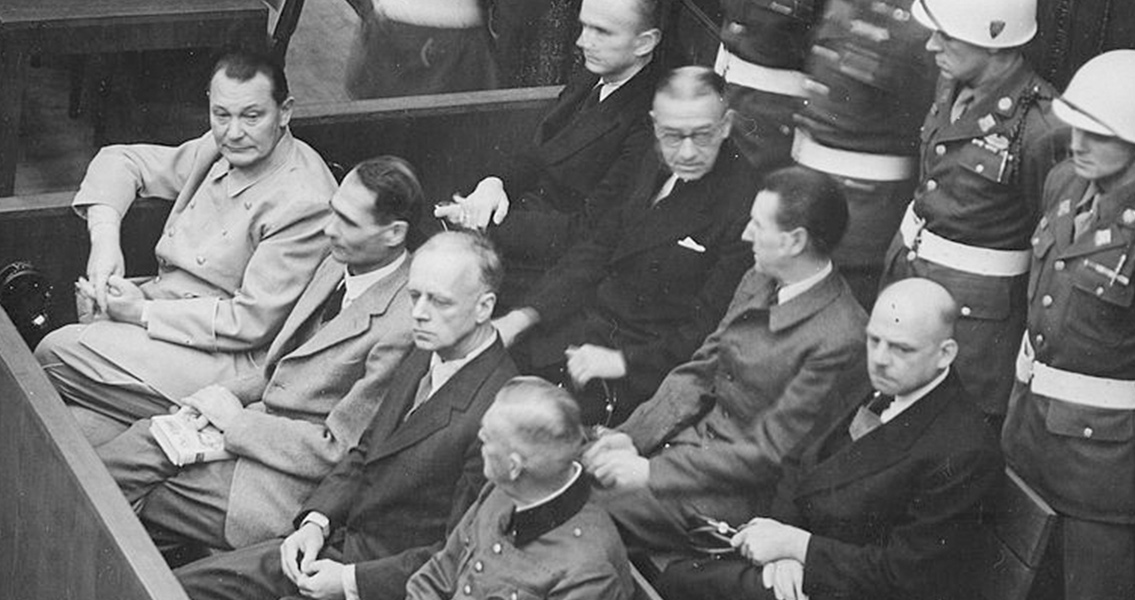<![CDATA[On November 20th 1945 the trial of Nazi war criminals began in Nuremberg, Germany. Although Adolf Hitler had killed himself several months before, the Nuremberg trials indicted those who had facilitated his regime and the mass extermination of Jews and other so called 'undesirables'. The trials were a key milestone in the twentieth century, and the forms they took seem to reveal that many of the protagonists knew the place they were taking in the history books. Over the course of thirteen trials and four years, charges ranging from crimes against peace to crimes against humanity were brought against the defendants. The initial trial, the one that started on November 20th, was for the prosecution of so-called 'major war criminals' - the upper echelons of the Nazi administration. This included notorious figures such as Hermann Goering, Joachim von Ribbentrop and Alfred Jodl. In total, twenty four men were tried in the initial trial, which lasted until October 1st 1946. Four charges were bought against these men, which would form the basis of the Nuremberg trials. The four charges were: 1). Participation in a common plan or conspiracy for the accomplishment of crime against peace. 2). Planning, initiating and waging wars of aggression and other crimes against peace. 3). War Crimes 4). Crimes against humanity The trials originated in December 1942, at the height of the Second World War. The leaders of the Allied powers, Britain, the Soviet Union and the USA, issued a joint declaration, noting the mass murder of Jews in Europe, and pledging to prosecute those responsible. The practicalities of how this would be achieved however, still needed finalising. It is believed that Stalin and Churchill suggested the execution of Nazi officers and officials, without going to court. President Truman however, strongly advocated that they should stand a full public trial. Ultimately, Truman won the argument, and the men on trial were given the opportunity to defend themselves. This meant that the crimes the defendants were charged with would have to be formally documented, removing potential accusations they had been charged without evidence. Transparent trials, where the Nazis would have a chance to defend themselves, would remove any doubts over the validity of the verdicts, and prevent suggestions in the future that the war criminals had been unjustly punished. The architects of the Nuremberg trials seemed aware early on of the important place they were taking in history. The trials themselves were pioneering events, setting a model that would be used for international trials of war criminals in the future. The Nazis were of course not the first war criminals in history to stand trial, but they were the first to stand trial in an international court. A comparable predecessor to Nuremberg, at least in terms of the nature of the crimes committed, was the trial in Turkey of the leaders responsible for the Armenian genocide, between 1915 and 1916. The defendants were all court martialled according to the traditions and customs of Turkey. The Nazis however, needed to be tried according to the differing legal traditions of all the Allied powers. Laws and procedures for the trial were established in the London Charter of the International Military Tribunal, which was issued on 8th August, 1945. The Charter, agreed by the three Allied powers, established the three types of crime the defendants would be charged with, as well as confirming that both civilian officials and military officers could be indicted. The format of the trials was a mixture of several legal traditions. Defendants and prosecutors were both entitled to legal representation (attorneys or barristers). Decisions and sentences however, were issued by a panel of judges, rather than a single judge and jury. The trials were of course hugely symbolic, marking the end of the Second World War and the start of the Cold War. One thing that is surprising is the amount of deliberate symbolism employed. The venue, Nuremberg, was chosen because it had been a site of some of the most important Nazi rallies. The hope was that trying the likes of Goering and von Ribbentrop here would clearly signal the end of the Nazi era. What's more, the decision to hold the trials publicly, was surely partially influenced by the Allie's desire to further appear on a moral high ground. Some of the men on trial helped formulate the Gestapo's covert tactics, while others had played a key role in the usurping of democracy in Germany, and the lands it had conquered. Nevertheless, the Allies gave them a fair trial, to prove how deeply their own democratic and legal values went. Befittingly for a period of history as shockingly unprecedented as Nazi Germany, the Nuremberg trials were a distinct, groundbreaking event in themselves, that still influence the international trial of war criminals to this day. They brought to an end a tragic part of history, but were carried out in way that seemed to consciously play up to their significance.]]>
The Start of The Nuremberg Trials
